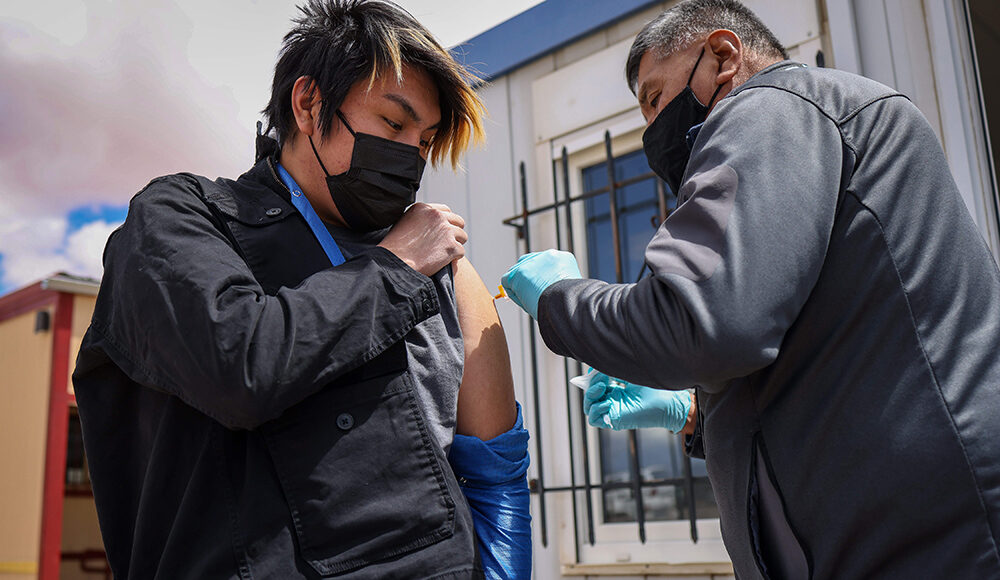By Sharon LaFraniere and Noah Weiland, The New York Times
A key advisory committee to the Food and Drug Administration voted unanimously Thursday to recommend a booster shot of the Moderna coronavirus vaccine for many of the vaccine’s recipients, at least six months after a second dose.
The panel endorsed a half-dose as a third injection for people 65 and older as well as younger adults at high risk because of their medical conditions or jobs, the same groups of people who became eligible for a Pfizer-BioNTech booster last month. While regulators are not obligated to follow the panel’s recommendations, they typically do.
Although committee members decried the lack of more robust data justifying a booster shot, several emphasized that the FDA had already set a precedent by authorizing additional shots on an emergency basis for many recipients of the Pfizer-BioNTech vaccine.
“From a pragmatic point of view,” said Dr. Stanley Perlman of the University of Iowa, “because we’ve already approved it for Pfizer, I don’t see how we can possibly not approve it for Moderna.”
The panel voted after hearing from Moderna officials, agency scientists and a top public health official from Israel, which began offering boosters to Pfizer recipients 2 1/2 months ago.
Dr. Eric Rubin, an adjunct professor of immunology and infectious diseases at the Harvard T. H. Chan School of Public Health, questioned whether Moderna has enough data showing whether a booster shot will create adverse side effects.
Like Pfizer, “Moderna is presenting the results of a relatively small trial,” he said. But “Pfizer had all those real-world data from Israel” on its booster campaign, showing results from “millions of people who received the vaccine,” he said.
Johnson & Johnson has asked the FDA to issue emergency use authorization for a booster for recipients of their vaccines, and the panel will vote Friday on the company’s request. They will also hear then about the initial results of an ongoing federal study that found Johnson & Johnson recipients may benefit more from a booster of Moderna’s or Pfizer’s vaccine.
Later Thursday, the committee will discuss, but not vote on, whether to consider broader eligibility for boosters of both Pfizer and Moderna’s vaccines, allowing people younger than 65 but not at especially high risk to get them.
In making its case for a booster last month, Pfizer-BioNTech argued that its vaccine, while highly protective in the early months, lost some potency against severe COVID and hospitalization over time. About the same time, a study by the Centers for Disease Control and Prevention found the efficacy of the Pfizer-BioNTech vaccine against hospitalization fell from 91% to 77% after a four-month period following the second shot.
But Moderna’s potency against hospitalization has held up better over time than Pfizer’s, the study found. On Thursday, Moderna did not argue that its vaccine requires a booster to prevent severe disease or hospitalization. Instead, it concentrated its arguments on preventing infection and mild to moderate disease.
Moderna said the mean antibody level of participants in its study was 1.8 times higher after the booster than it was after the second shot, meeting the FDA’s criteria. But tests showed the booster narrowly failed to meet another requirement. It raised neutralizing antibodies at least fourfold in 87.9% of people compared to after the second dose, while the agency required that level of boost for 88.4% of participants.
One of the first presentations Thursday came from Israeli health officials, who said their booster campaign for Pfizer-BioNTech vaccine recipients significantly lowered rates of infection and severe disease.
The Biden administration has been closely watching Israel’s experience because the country has a nationalized health care system that allows it to closely track recipients.
Since Israel’s data deal only with Pfizer’s vaccine, it was not clear how much weight committee members will give it. But it did provide them with more information than they had last month before voting to recommend a booster for many Pfizer recipients. Several panel members described the data as compelling, although one cautioned about drawing conclusions from the experience of such a different country.
Israeli scientists analyzed rates of infection and severe illness among 4.6 million people from July 30, when the country first began offering boosters, to Oct. 6. They compared rates among people who got a third dose to those among people who did not, and said they used the same definition of severe disease as the one used by the National Institutes of Health.
Israeli officials said they found a booster improved protection against infection across all age groups about tenfold.
Rates of severe illness were 6-to-20-fold lower for those 60 years or older and 3-to-20-fold lower for those ages 40-60, the researchers said, although the number of severely ill people in the latter group was very small even before boosters were given. Death rates were 3-to-10-fold lower among the elderly, they said.
A crucial question was not clearly answered during the Israelis’ presentation: Whether the recent drop in cases there could be at least partly due to the retreat of the highly contagious delta variant.
The Israeli results have been published by a preprint service but have not been peer-reviewed.
In a brief presentation using data from a federal safety monitoring program, Dr. Hui-Lee Wong, an FDA official, cited an elevated risk in men ages 18-25 who were fully vaccinated with either Moderna’s or Pfizer’s vaccines of myocarditis or inflammation of the heart muscle, and pericarditis or inflammation of the lining around the heart.
Occurrences of those side effects increased after the second dose, she said. Preliminary reports of the side effects did not suggest one vaccine was riskier than the other, but Wong cautioned that a conclusion was uncertain because of the small number of cases.
The findings aligned with what federal regulators and scientists already know. The FDA in June attached warnings describing the risk to the labels for both vaccines.
This article originally appeared in The New York Times.














